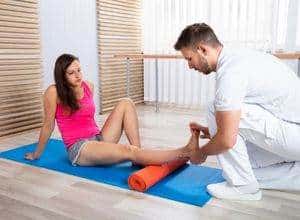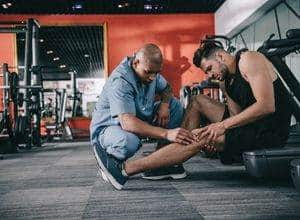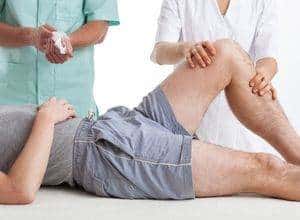
Have you ever seen a sports medicine specialist at some point in your life? Are you a beginner athlete? Do you like to engage in physical activities and exercise to stay fit and healthy? If so, you may have already suffered a sports injury.
A sports medicine specialist is an orthopedic expert who treats athletes and anyone suffering from musculoskeletal problems. They have been educated to manage every sports-related concern, from joint discomfort to osteoarthritis to nutrition.
Although sports medicine specialists are most recognized for counseling and treating amateur and professional players who have sustained sports injuries, they also diagnose and treat "weekend warriors" and retirees who have been sore or hurt while playing tennis or golf.

No. Sports injuries are musculoskeletal injuries that arise during physical activity or when engaging in sports. Children are more vulnerable to sports-related injuries than adults. However, adults may still be injured, particularly if they participate in contact sports or do not warm up properly before exercising. If you are not routinely active but suddenly start participating in a sport or physical activity, you are more likely to get a sports injury.
Furthermore, a sports medicine specialist is trained in both preventing and treating musculoskeletal ailments. Sports doctors are also highly educated to identify and treat young and older individuals with bone, muscle, or joint problems.
Sports medicine specialists are trained and prepared to diagnose and treat various sports injuries and diseases involving the musculoskeletal system, including bones, tendons, ligaments, and muscles. They are also skilled in diagnosing and treating concussions and traumatic brain damage (TBI).
To correctly diagnose your injury, the sports medicine specialist will analyze your degree of discomfort, range of motion, and function and may request diagnostic procedures such as an X-ray or an MRI. A sports medicine specialist's specialization is often in nonsurgical treatment approaches and preventative care to assist clients in regaining their original health and continuing to participate in their sport.
They are responsible for a variety of tasks, which may include:
Below are three of the most common medical illnesses and injuries that a sports medicine specialist identifies and treats:

An injury to the tendons and muscles that support the shoulder joint is known as a rotator cuff injury. It typically affects baseball pitchers and tennis players who undertake repetitive overhead movements; it may also affect people who execute inappropriate repetitive motions that tug on the shoulder. The tear might be partial or complete, and a complete rotator cuff tear may need surgery.
The symptoms often begin with dull aching in the shoulder. It often disrupts sleep, particularly if you sleep on your afflicted shoulder. Patients suffering from this shoulder injury often complain of arm weakness, making it difficult to comb their hair or put on a shirt.
When excessive pressure is applied to the rear of the lower leg, such as landing from a jump, the Achilles tendon may tear or rupture. Patients with a torn Achilles tendon may experience a rapid onset of acute pain in the heel region. Others may also hear a cracking sound when the tendon ruptures, making walking difficult.
Strains and sprains are part of the most frequent injuries suffered by athletes and regular individuals who exercise or participate in sports. Overexertion or moving uncomfortably may cause muscle strain. A strain, often called a pulled muscle, occurs when muscles or tendons rip or overstretch. A sprain is caused by ripping or overstretching ligaments, such as those in the ankle. Treatment for sprains and strains may include:
Athletic activities often cause back, neck, and shoulder discomfort. These injuries may range from minor discomfort to extreme agony. For such situations, sports medicine specialists may offer a range of therapies. Doctors may offer a range of therapies after identifying the condition.

Athletes and persons who regularly participate in various sports are often injured due to the overuse of specific body parts. Tennis elbow, for example, is common in those who play tennis or other racquet sports. Baseball pitchers are damaging their elbows, swimmers injuring their shoulders, and joggers or runners injuring their knees are further instances. These types of injuries are usually classified as tendonitis because they include inflammation of tendons such as the elbows and knees.
Concussions and other brain injuries are caused by an impact, such as being struck by a ball, colliding with another player, or collapsing to the ground. Athletes that participate in contact sports such as football, basketball, rugby, and hockey, as well as combat sports like boxing, wrestling, and martial arts, are more vulnerable to head injuries. Concussion victims must be carefully assessed since the amount of the injury is not usually visible.
While EMTs may first treat concussions, sports medicine professionals often monitor progress and advise patients on a recovery approach. Neurologists and radiologists, for example, may also be consulted.
These are injuries that occur unexpectedly while participating in a sport or exercising. Sprains and strains are common. Muscle and knee injuries, shattered bones, dislocated joints, and Achilles tendon injuries are more serious. That's the tendon behind your ankle that connects the calf muscle to your heel bone.
Acute injury symptoms may include:
These are injuries that occur gradually. They often result from practicing too hard or for too long. A rotator cuff injury is a typical example (a group of muscles and tendons in your shoulder). Other examples include a swollen tendon (tendinitis) and bone breaks (stress fracture).
Among the symptoms of these injuries are:
You should see an orthopedic surgeon if you have a fractured bone or a dislocated joint due to a sports accident.
Surgery may be required to repair:
A sports medicine specialist can help you heal from a sports injury or surgery and return to normal activities. The recovery process should start as quickly as possible. This reduces muscular stiffness and weakness. Returning to your activity or exercising too quickly, on the other hand, might result in another injury. A sports medicine specialist will create a recovery plan for you and may assist you with:

An excellent reason to consult a sports medicine specialist is to avoid a sports injury. Think about it if you're beginning a new sport, athletic activity, or fitness routine. The visit might include:
Sports physicians typically treat players, but they may also treat non-athletes. A sports medicine specialist is the person to go to if you want to start an exercise program or become more active. They can assist you in developing a safe, effective workout plan that addresses underlying health issues and avoids injury.